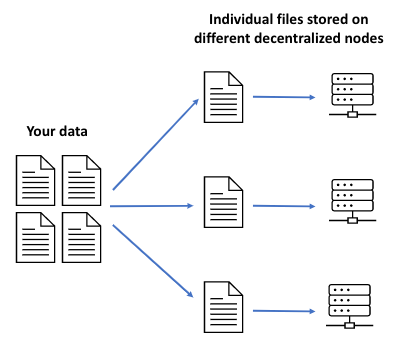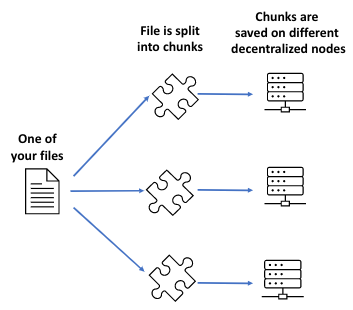Then It’s Time to Use Decentralized Data Storage
Yesterday, GoTo – the owner of LastPass – announced that encrypted back-ups for LastPass, Central, Join.me, Hamachi, and Remotely Anywhere had been stolen by hackers. To make matters worse, not only were the encrypted back-ups stolen – the company’s encryption key was also stolen. This means all the stolen data has been fully compromised.
All of these back-ups were stored in nameless “third-party cloud service,” i.e., probably AWS S3, Google Cloud, or Microsoft Azure Blob Storage.
If there’s ever a clarion call for decentralized storage (for both consumers and enterprises), this is it.
What’s Decentralized Storage?
To properly understand decentralized storage, it’s important to first understand centralized storage and then compare it to decentralized storage.
Centralized storage is when your data is stored with one party. Your data might reside on multiple machines — I.e., when you store your data in an S3 bucket, it might look like 1 bucket, but all your data doesn’t have to physically reside on the same machine – but the key point is, one party controls all the machines your data is stored on.
Decentralized storage is when your data is stored on multiple machines that aren’t owned and controlled by the same party. They’re owned and/or controlled by multiple, unrelated parties.
Your data can be decentralized file by file, like this:

In addition, any given file can also be decentralized across multiple unrelated machines, like this:

You can also watch our video, What is Decentralized Storage?
Why Decentralized Storage is More Secure than Centralized Storage
Decentralized storage has many inherent security advantages to centralized storage. You might think, wait, how can storing my data on random people’s computer possibly be safer than storing my data in an AWS S3 bucket? Here’s how.
- Decentralized storage decreases the likely value of any one data store.
Hackers like to break into machines that store A LOT of data. That’s why tech giants with lots of data always get hacked – more customers mean more customer data. More customer data means more money to be made on the Dark Web.Any random decentralized storage node stores less data than a centralized data store. As such, it’s probably much less valuable for a hacker to hack into a decentralized storage node than a centralized store.
Decentralized storage increases the cost/effort associated with a hack.
Let’s say your data is stored on 100 decentralized nodes. In order for someone to steal all of your data, they would need to do 100 hacks. Each node is independent and would need to be hacked into independently.
Hackers are people too. They only have so much time in a day to hack. Bang for buck, smart hackers are going to continue to focus on hacking into large, centralized data repositories as opposed to going after many more smaller data stores.
Decentralized data storage is fully encrypted, always.
Storing your data on a centralized cloud doesn’t automatically guarantee that the data is fully encrypted. Most hacks (just not the one above) occur when clear-text data is stored on centralized servers.
By its very nature, decentralized storage is always encrypted. In fact, owners of decentralized storage nodes won’t be able to identify whose data is being stored on their machines.
Finding where your decentralized data is stored is difficult.
Because all data on a decentralized network is automatically encrypted, it’s impossible for a hacker to search the network for your name (or any other personal identifiers) to find where exactly your data resides in the network.
Centralized storage is more susceptible to human error.
Centralized data storage requires large companies. Large companies have lots of employees. More employees means more people seeing your data (if it’s not encrypted, see above) and more room for human error. Human error could mean leaving a laptop on without automatic password lock. It could mean accidentally leaving an S3 bucket public. It could mean getting credentials phished. It could mean…practically anything.
With decentralized data storage, there’s only one human (you) that matters. Fewer humans mean a lower chance of human error.
Fog Works is creating next-generation decentralized storage node called Foggie Max. Foggie Max does more than just store data – it’s a full computer with a CPU and RAM, and it can run dApps, make your public content uncensorable, reduce digital piracy, and accelerate your Web3 content.
Foggie Max is coming to crowdfunding soon. Reserve your copy of Foggie Max and a deep launch discount now.

